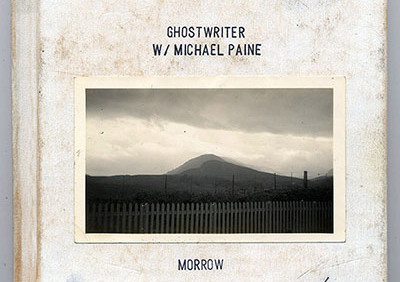From Adequacy comes this review:
Ghostwriter w/Michael Paine – Morrow
Ghostwriter – Morrow
Having carved himself an inventive niche under his Ghostwriter guise with 2010’s The Continuing Adventures Of The Strange Sound Association album and 2013’s Dimensions EP, Mark Brend (erstwhile member of Mabel Joy, The Palace Of Light, Farina and Strange Sounds Orchestra) returns again with a new label, a slightly wider cast of contributors and a warmer though no less esoteric sonic approach. With Brend’s newest collaborator Michael Paine sharing the billing, Morrow is an endearing product of English eccentricity being expressed far from the madding metropolitan crowd by a low-key conjoining of likeminded souls.
Inspired by mid-20th century novelist Phyllis Paul, a writer with a penchant for both the natural and the supernatural, Morrow may certainly feel like a soundtrack disembodied from an unfinished book-to-film adaptation but it’s one that certainly functions well in its own otherworldly non-rock bubble. Deploying a dizzying array of instrumentation (everything from autoharp and dulcimer to synth and vibraphone), antique samples (primarily ghostly voices from out of copyright TV shows and films), found sounds (ticking clocks and lapping coastal waters) and the returning largely wordless Victoriana vocals of ex-George chanteuse Suzy Mangion, Morrow fashions an immersive sound world to get lost inside.
Whilst the collection ebbs and flows elegantly as one continuous piece, individual highlights are still apparent and different ones appear on each listen. Hence, cherry-picked delights at time of writing include the multi-suited home-to-harbour journeying of “Cooling Bay,” the wistful minimalism and incorporeal plummy voices of the sub-editor troubling “(s)pace (l)eft (o)ver,” the synth-subverted classical twinkling of the Wendy Carlos-indebted “Secker Morrow Waltz,” the haunted yet beatific evocations of “The Death of Phyllis Paul,” the choral Mangion-led bucolic balminess of “Bidding Bell,” the pretty melancholic explorations of “Our Sweet Portion,” the plaintive piano and foreboding percussion juxtaposing of “Twice Lost” and the ISAN-like electronica of “The Hemel Hempstead Mystery.”
Ultimately, journalistic dissection can only take you so far into explaining the near-magical qualities of Morrow – arguably one of this year’s most transporting and thought-provoking treasures. Let your own ears do the judging and hunt it down before it’s lost in a limited edition haze.
———————————-
From Wormwoodiana comes this review:
MORROW – Ghostwriter and Michael Paine
Here’s an unusual and unexpected work: music inspired by Phyllis Paul. Until about ten years ago, the novels of this austere and enigmatic author were lost amongst the dustiest bookshelves. But then Glen Cavaliero of Cambridge University began to write about her work, and continued with calm persistence to champion her wherever he could. It was a footnote in his study of Charles Williams that first alerted me to her. Since then, he has written about her in Wormwood 9 (“Mysteries of The Thirteenth Hour: The Enigmatic World of Phyllis Paul”), spoken of her to The Powys Society and others, and introduced a reprint of her A Cage for the Nightingale (Sundial Press).
I particularly remember listening to Glen tell about the phrase used by the motorcyclist involved in the accident that led to her death. She was blown across the street, he said, just like a sheet of paper. Her books remain hard to find and second-hand copies disappear as soon as they are discovered. A few titles have eluded searchers for years. And there remain mysteries about her life and work which several researchers are still trying to fathom. Doug Anderson has recently discovered that she probably had an earlier career as an illustrator of children’s books (see earlier post here).
Ghostwriter and Michael Paine have now released an album, Morrow(on Time Released Sound), which is inspired in part by Phyllis Paul’s books. Her readers will recognise some overt references in the titles (‘Cooling bay’, ‘Pulled down’) and less obvious ones alluding to her life or conjuring scenes and phrases in her work. The two musicians describe their work here as “English pastoral noir, drawing variously on folk, evangelical hymns, jazz, Debussy and Maurice Deebank.” (The latter was the guitarist on the smouldering songs and instrumentals made by the band Felt, a great favourite of mine.)
The music is on the surface gentle, with hints of musical boxes, fairground organs, grandfather clock chimes, and graceful ballet scores. But there are also more sinister sounds – disembodied voices, stray incursions of curious noise, off-key notes, cymbal splashes like footsteps pounding through damp streets. I was reminded of the theme and incidental music to the Seventies TV series “Thriller”, or such haunting Sixties tunes as “Windmills of Your Mind”. Morrowsucceeds wonderfully in creating a pensive atmosphere of genteel peculiarity, where at any moment toys might start talking or the door of the nursery cupboard could swing open upon the abyss.
Filed under Reviews
Tags: adequacy-blog, Ghostwriter, Michael Paine, morrow, music, review, time released sound, Wormwoodiana










